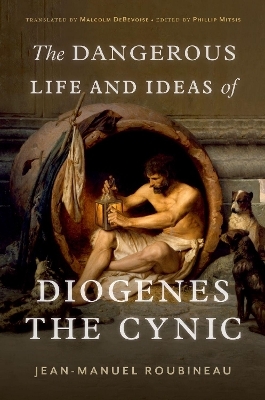
The Dangerous Life and Ideas of Diogenes the Cynic
Seiten
2023
Oxford University Press Inc (Verlag)
978-0-19-766635-7 (ISBN)
Oxford University Press Inc (Verlag)
978-0-19-766635-7 (ISBN)
In Diogenes the Cynic, Jean-Manuel Roubineau presents a moving and authoritative portrait of one of the most idealized and mocked intellectuals in antiquity.
An engaging look at the founder of one of the most important philosophical schools of ancient Greece.
The ancient philosopher Diogenes--nicknamed "The Dog" and decried by Plato as a "Socrates gone mad"--was widely praised and idealized as much as he was mocked and vilified. A favorite subject of sculptors and painters since the Renaissance, his notoriety is equally due to his infamously eccentric behavior, scorn of conventions, and biting aphorisms, and to the role he played in the creation of the Cynic school, which flourished from the 4th century B.C. to the Christian era. In this book, Jean-Manuel Roubineau paints a new portrait of an atypical philosopher whose life left an indelible mark on the Western collective imagination and whose philosophy courses through various schools of thought well beyond antiquity.
Roubineau sifts through the many legends and apocryphal stories that surround the life of Diogenes. Was he, the son of a banker, a counterfeiter in his hometown of Sinope? Did he really meet Alexander the Great? Was he truly an apologist for incest, patricide, and anthropophagy? And how did he actually die? To answer these questions, Roubineau retraces the known facts of Diogenes' existence.
Beyond the rehashed clichés, this book inspires us to rediscover Diogenes' philosophical legacy--whether it be the challenge to the established order, the detachment from materialism, the choice of a return to nature, or the formulation of a cosmopolitan ideal strongly rooted in the belief that virtue is better revealed in action than in theory.
An engaging look at the founder of one of the most important philosophical schools of ancient Greece.
The ancient philosopher Diogenes--nicknamed "The Dog" and decried by Plato as a "Socrates gone mad"--was widely praised and idealized as much as he was mocked and vilified. A favorite subject of sculptors and painters since the Renaissance, his notoriety is equally due to his infamously eccentric behavior, scorn of conventions, and biting aphorisms, and to the role he played in the creation of the Cynic school, which flourished from the 4th century B.C. to the Christian era. In this book, Jean-Manuel Roubineau paints a new portrait of an atypical philosopher whose life left an indelible mark on the Western collective imagination and whose philosophy courses through various schools of thought well beyond antiquity.
Roubineau sifts through the many legends and apocryphal stories that surround the life of Diogenes. Was he, the son of a banker, a counterfeiter in his hometown of Sinope? Did he really meet Alexander the Great? Was he truly an apologist for incest, patricide, and anthropophagy? And how did he actually die? To answer these questions, Roubineau retraces the known facts of Diogenes' existence.
Beyond the rehashed clichés, this book inspires us to rediscover Diogenes' philosophical legacy--whether it be the challenge to the established order, the detachment from materialism, the choice of a return to nature, or the formulation of a cosmopolitan ideal strongly rooted in the belief that virtue is better revealed in action than in theory.
Jean-Manuel Roubineau is a specialist in ancient history. He previously published Milon de Crotone ou l'Invention du Sport and Les cités grecques, winner of the European History Book Prize in 2016. Phillip Mitsis is Alexander S. Onassis Professor of Hellenic Culture and Civilization, Professor of Classics and Hellenic Studies, and affiliated Professor of Philosophy and Medieval and Renaissance Studies at New York University.
Foreword
Introduction
1. Diogenes, Foreigner
2. Rich as Diogenes
3. Diogenes, or the Proper Use of the Body
4. Diogenes, Mentor
Acknowledgements
| Erscheinungsdatum | 05.05.2023 |
|---|---|
| Übersetzer | Malcolm DeBevoise |
| Zusatzinfo | 6 |
| Verlagsort | New York |
| Sprache | englisch |
| Maße | 148 x 211 mm |
| Gewicht | 313 g |
| Themenwelt | Geschichte ► Allgemeine Geschichte ► Vor- und Frühgeschichte |
| Geisteswissenschaften ► Philosophie ► Philosophie Altertum / Antike | |
| ISBN-10 | 0-19-766635-3 / 0197666353 |
| ISBN-13 | 978-0-19-766635-7 / 9780197666357 |
| Zustand | Neuware |
| Informationen gemäß Produktsicherheitsverordnung (GPSR) | |
| Haben Sie eine Frage zum Produkt? |
Mehr entdecken
aus dem Bereich
aus dem Bereich
Was Pompeji über uns erzählt
Buch | Hardcover (2023)
Propyläen (Verlag)
CHF 44,75
auf den Spuren der frühen Zivilisationen
Buch | Hardcover (2023)
C.H.Beck (Verlag)
CHF 27,95


